General, Sir John Monash, Personal Files Book 23, 1 June - 23 September 1919- Part 7
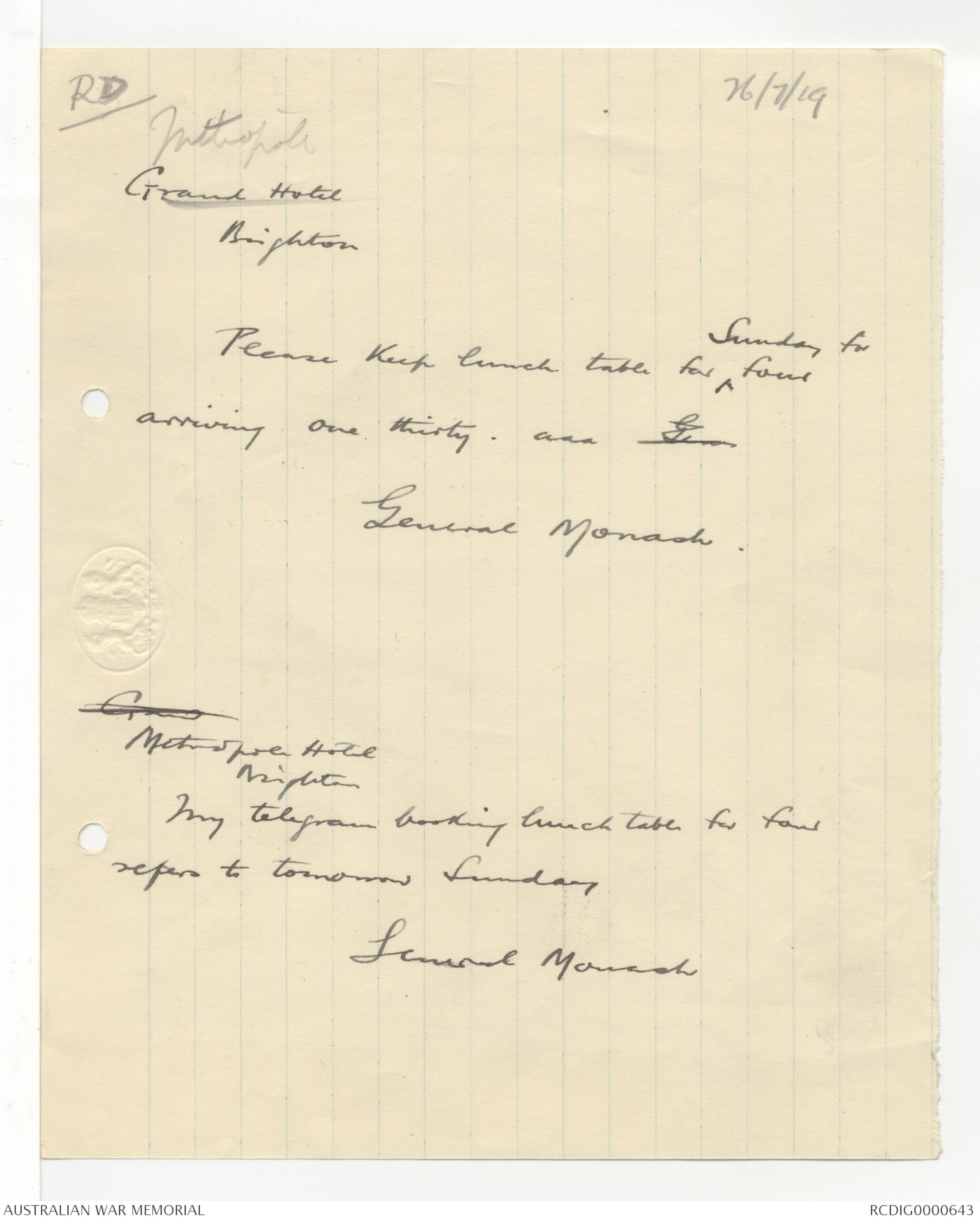
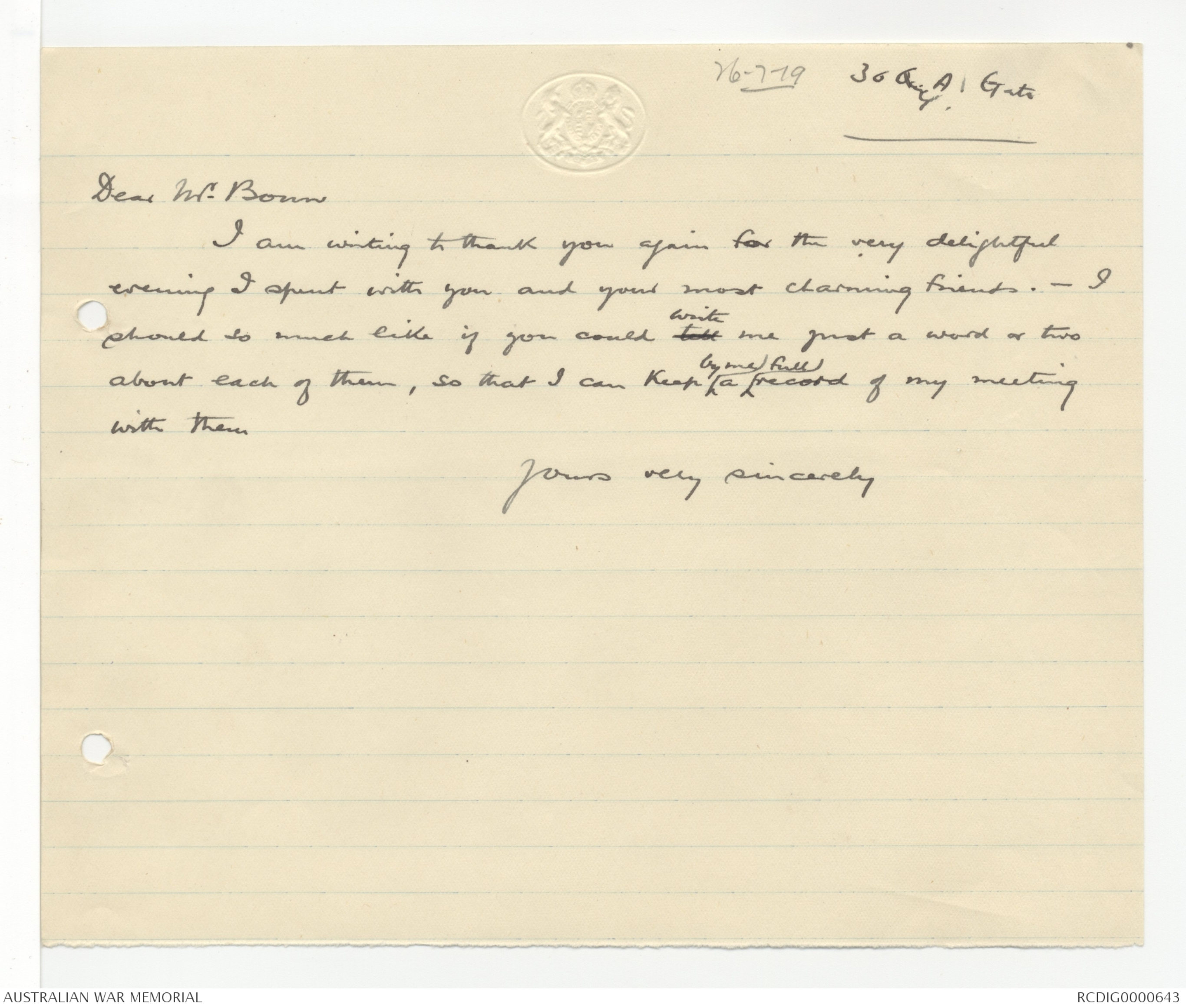

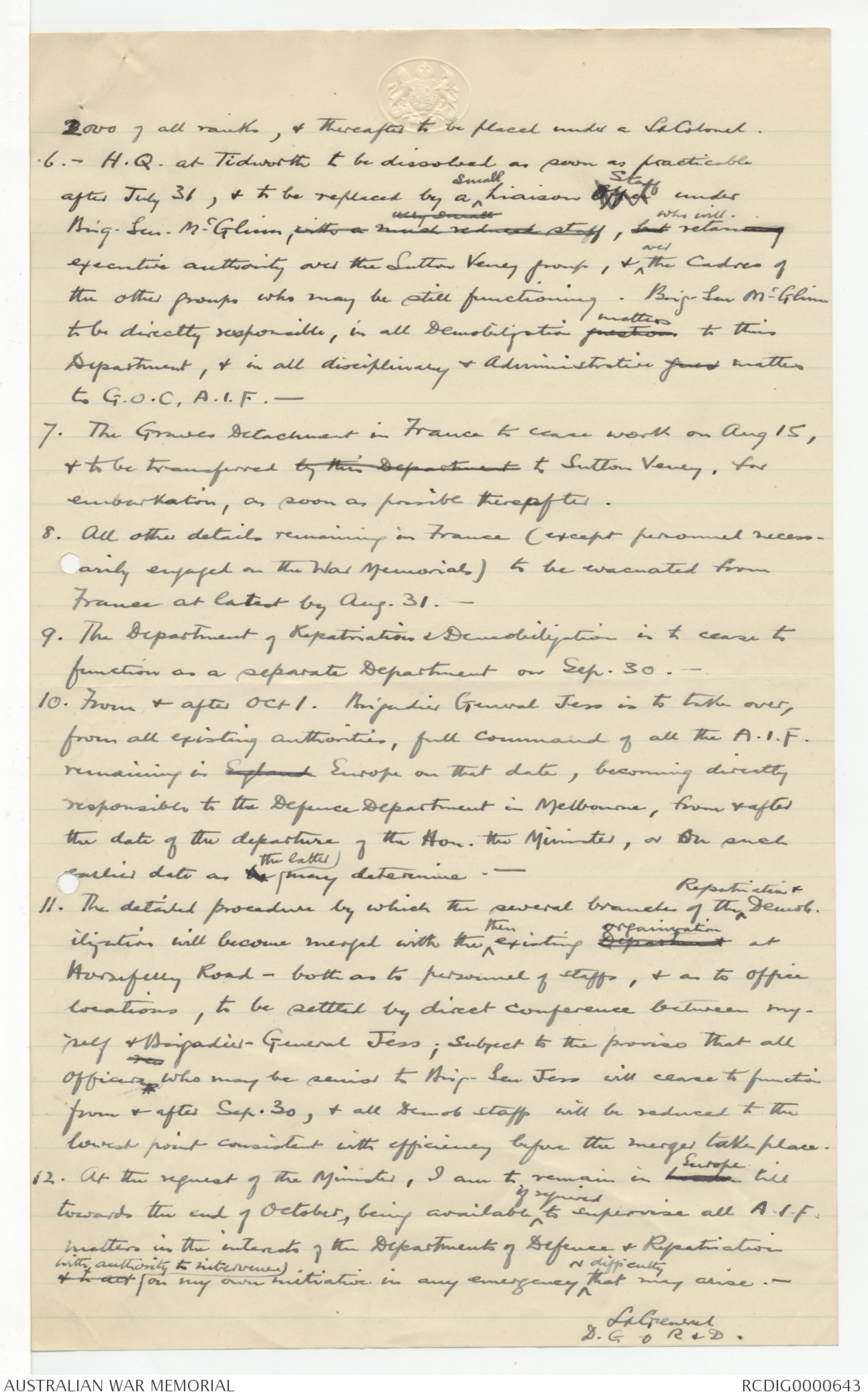
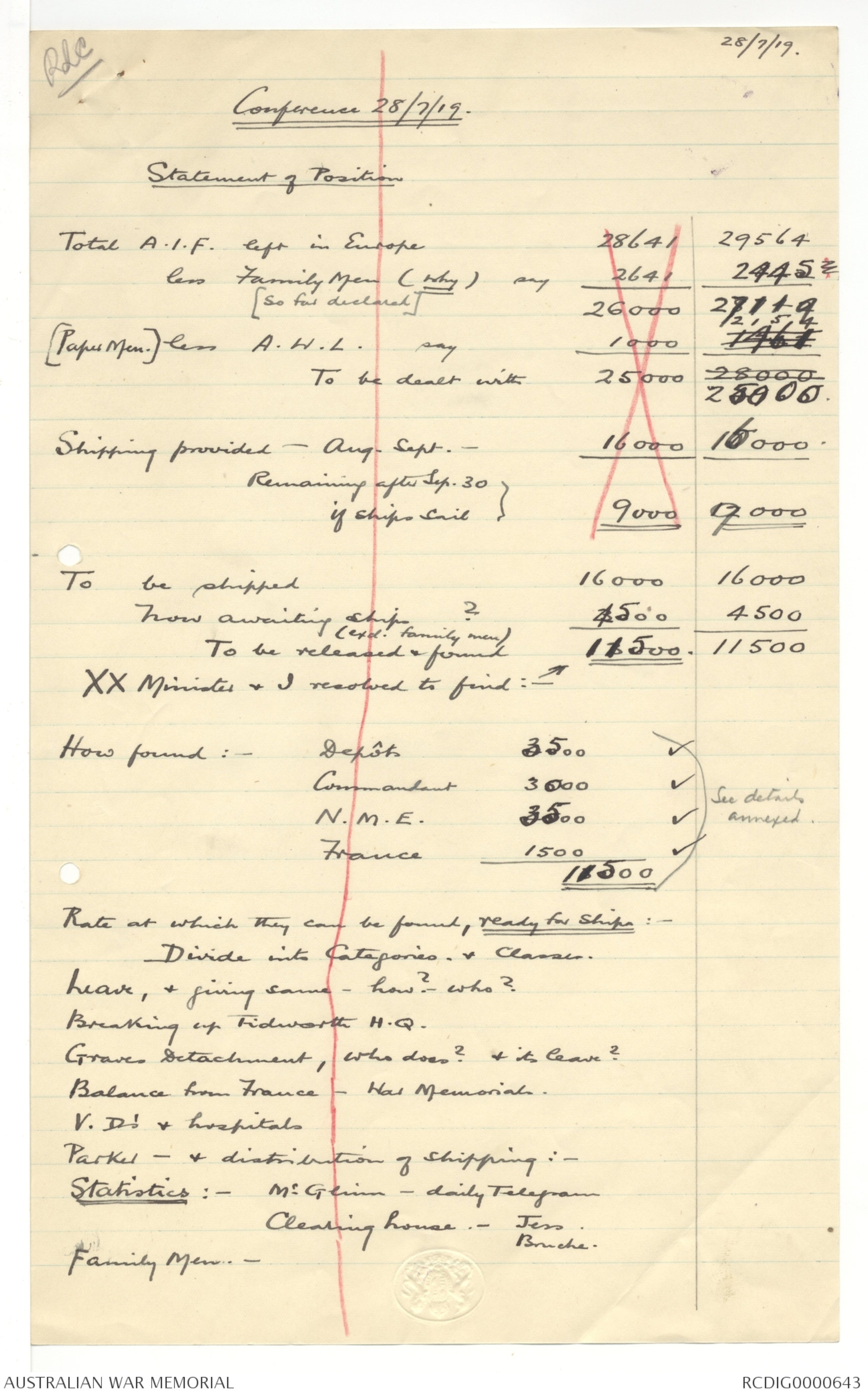
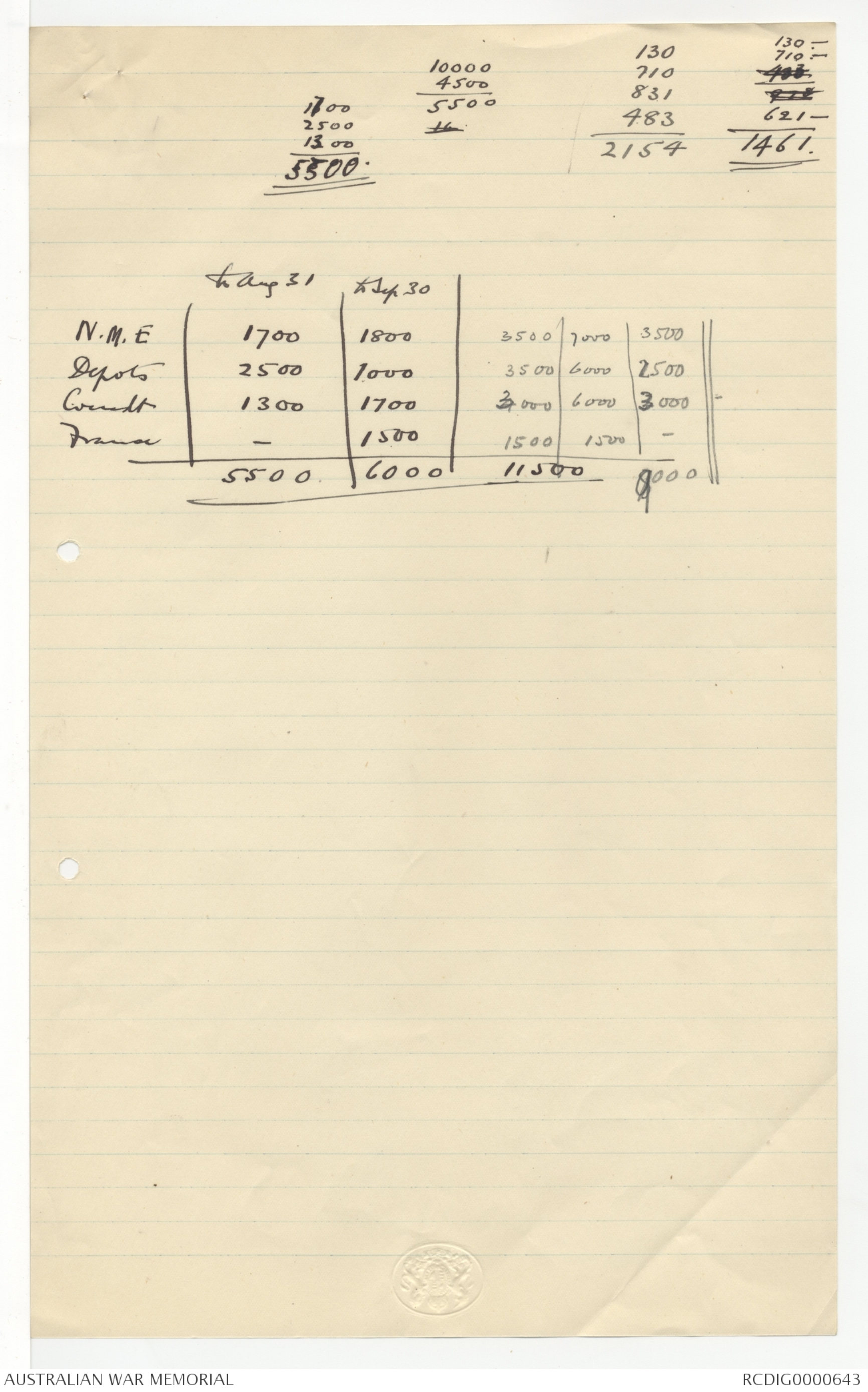
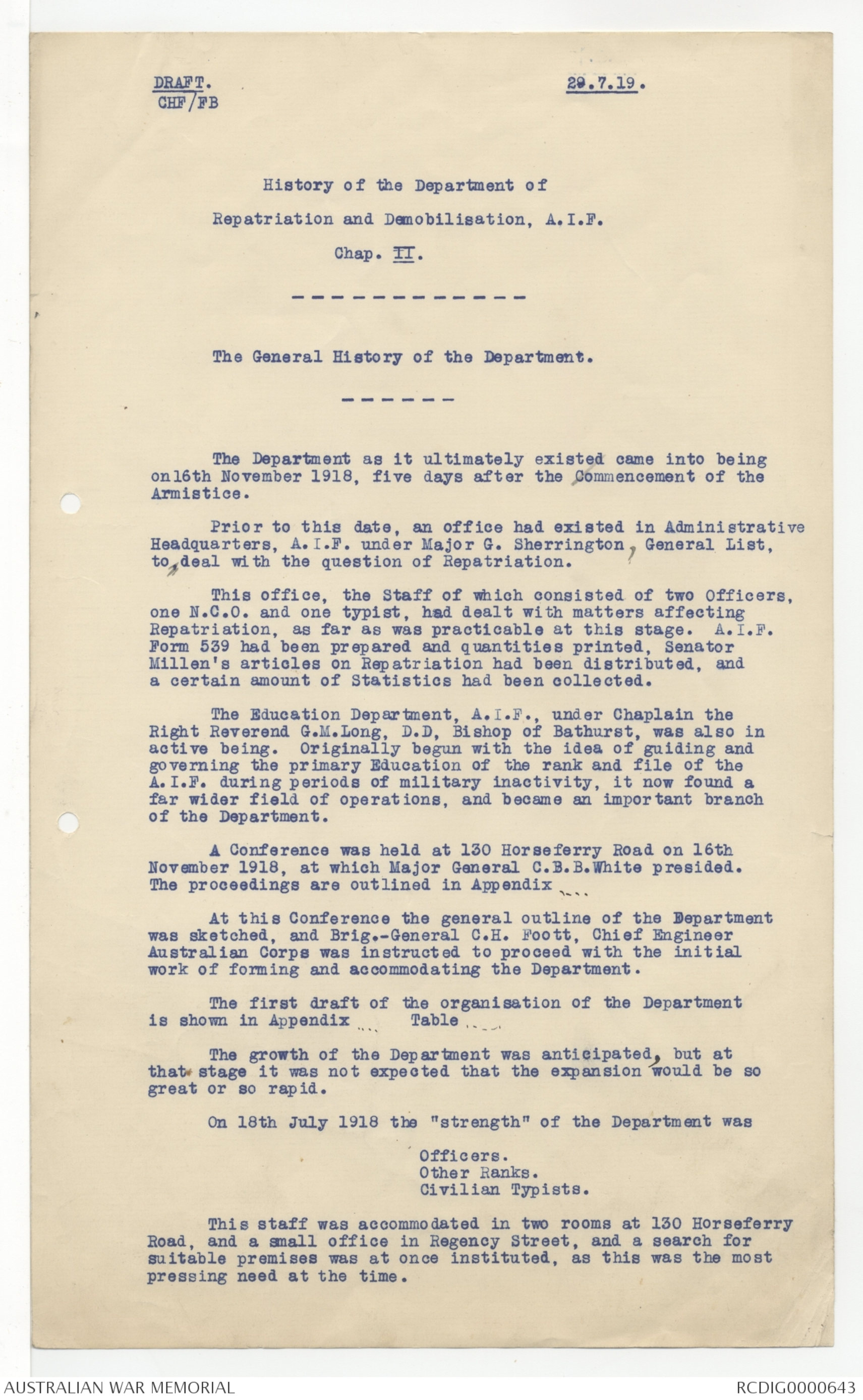
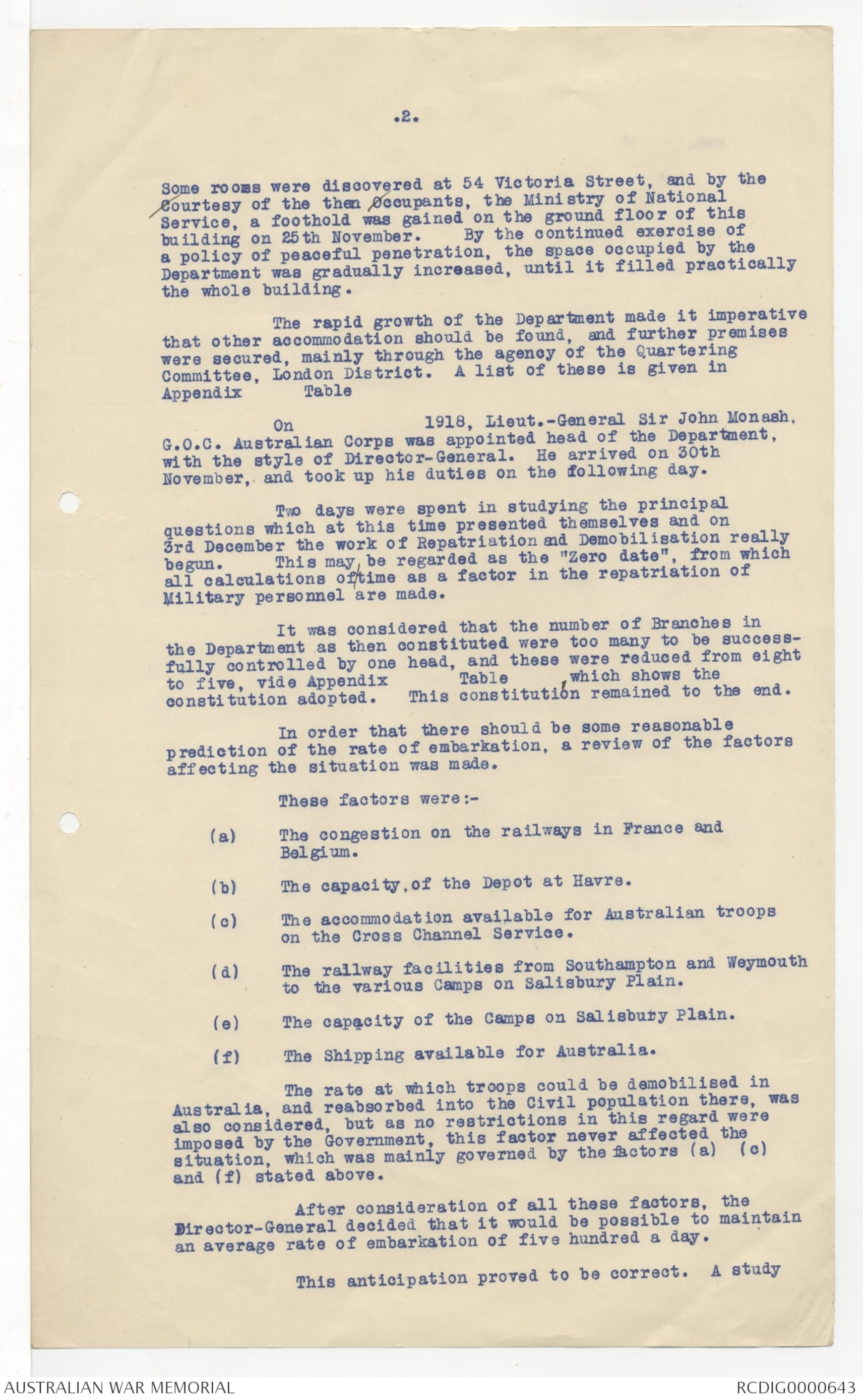
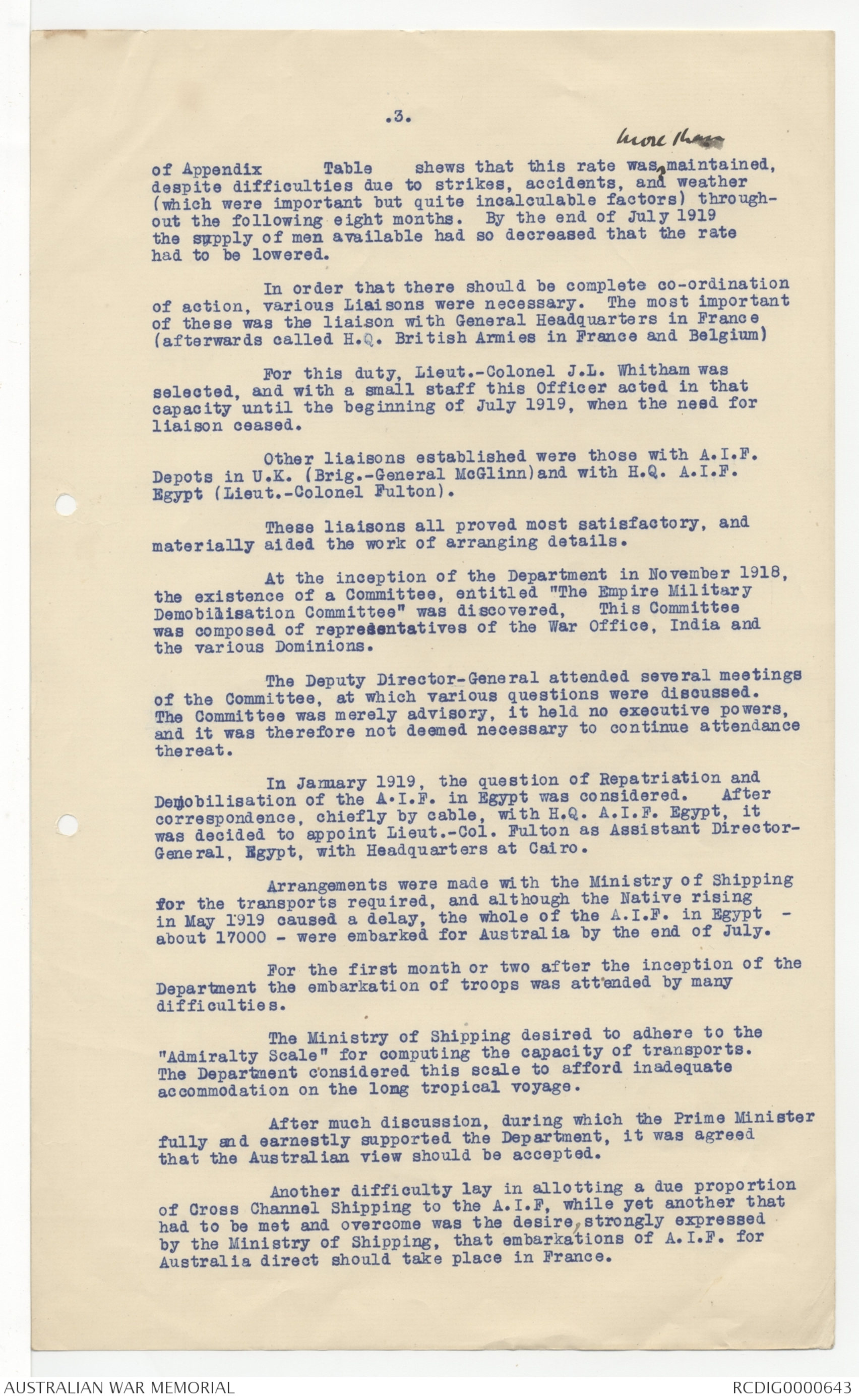
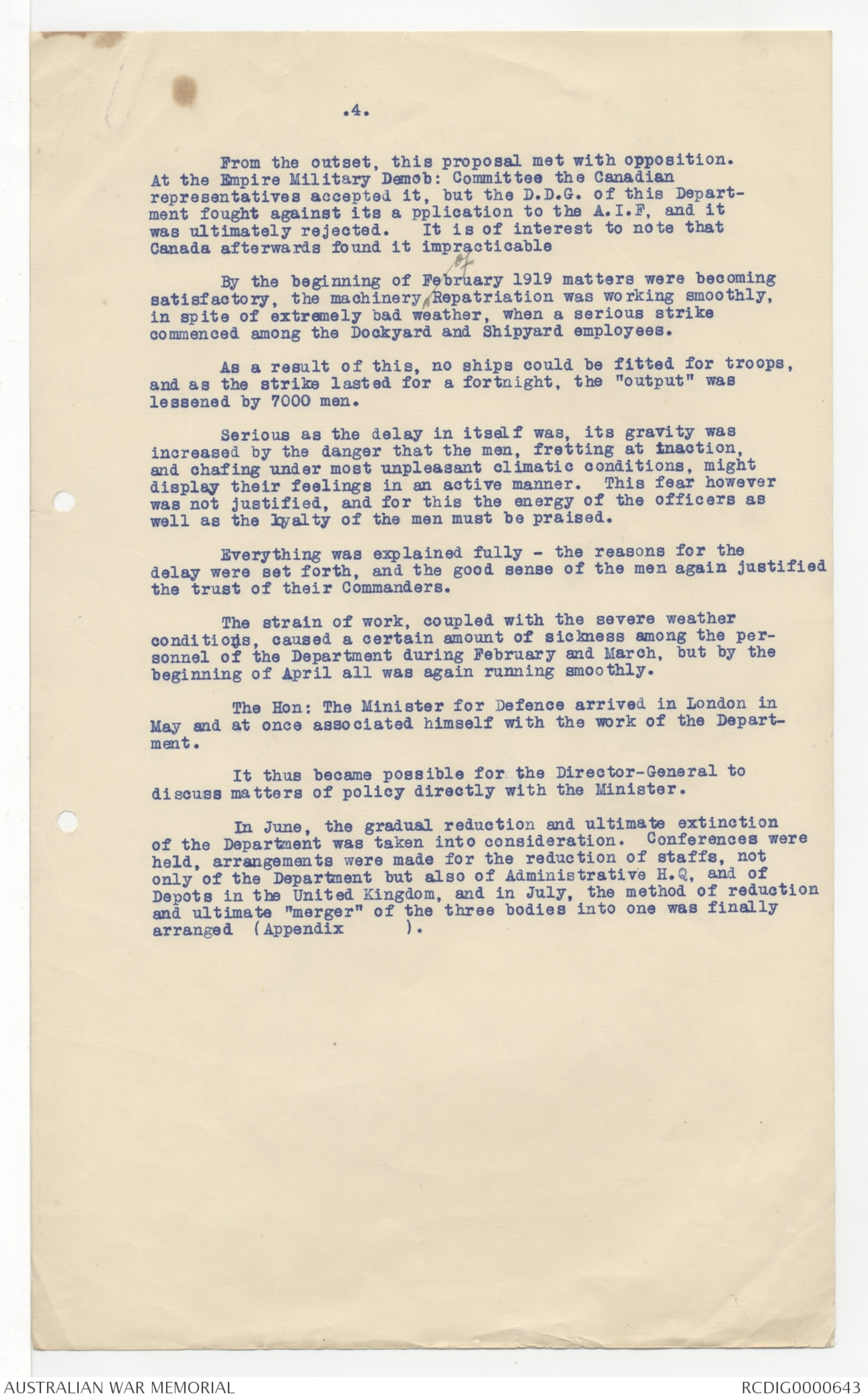
[*RD 16/7/19
Metropole*]
Grand Hotel
Brighton
Please Keep lunch table for ^Sunday for four
arriving one thirty. aaa Gen
General Monash.Gran
Metrople Hotel
Brighton
My telegram booking lunch table for four
refers to tomorrow Sunday
General Monash
[*16-7-19*] 36 Orig. A1 Gate
Dear Mr Bonn
I am writing to thank you again for the very delightful
evening I spent with you and your most charming friends. - I
should so much like if you could tell write me just a word or two
about each of them, so that I can Keep ^by me a ^full record of my meeting
with them
Yours very sincerely
RD Draft 28/7/19
Confidential
1 copy for Gen. Birdwood
1 " for my table
1 " for Lt Col Borwick
1 " for D.D.G
1 " file
1 " spare
6 copies.
G.O.C, A.I.F.
Following upon the Conference held by. Minister of Defence at
Australia House on 8th inst. with reference to the closing stages of the
Demobilization of the A.I.F., & having now received from the Brig Gen
i/c Administration A.I.F. H.Q. London a detailed estimate forecast of the
rate at which ∧having regard to the decisions given by the Minister at that Conference,
the several branches under his jurisdiction can be
dissolved. I beg now to submit, for your approval, & if approved,
for transmission to the Hon the Minister, concrete
proposals for the procedures to be adopted:-
1. I estimate that by September 30, (subject to the under-noted
recommendations being given affect to), that the total personnel
remaining in Europe in the category of employed men ^'staffs', i.e. on the
respective staffs of A.I.F. HQ, Rep & Demob. Department, & A.I.F.
Depots in U.K., & including personnel on Non-military Employment,
will have been reduced to less than 12000 of all ranks.
2. This is exclusive of ^unembarked 'family men' or of personnel, formerly hitherto belonging to such
'staffs', who may have been released from duty prior to Sep. 30, but
who may not have ∧actually embarked by that date. Such number is
uncertain, depending as it does on the punctuality of sailings
listed for August ∧& September but is unlikely under the most unfavourable
circumstances to exceed 5000 of all ranks. -
3. I anticipate therefore that the total personnel in Europe on Sep. 30
will be not less than 12000 & not more than 17000 of all ranks. This
number will include ∧about 3000 persons on Non-Military employment
with too courses of training ∧then not yet expired. -
4. All A.I.F. Depots in U.K. will have except Sutton Veney will, before
July 31 have ∧been evacuated, to ships or to concentration depots, all their
personnel except small cadres engaged in handing over ∧& disposal of stores,
repair of barrack damages & the like. - I propose to demobilize not once by then All the H. Q. & all the staffs (except Cadres) of all
depots except other that Sutton Veney ^are being now demobilized as fast as each is emptied. -
5. From & after July 31, A.I.F. depots in U.K. to be reduced to one
group at Sutton Veney, to remain under the immediate command of Brig. Gen.
Robertson, until such time as the population of the group falls bellow
1
2000 of all ranks, & Thereafter to be placed under a Lt Colonel.
6. - H.Q. at Tidworth to be dissolved as soon as practicable
after July 31, & to be replaced by a ∧small liaison office staff under
Brig. Gen. McGlinn, with a much reduced staff very small, Last who will retaining
executive authority over the Sutton Veney group, & ∧over the Cadres of
the other groups who may be still functioning. Brig. Gen McGlinn
to be directly responsible, in all Demobilization functions matters to this
Department, & in all disciplinary & administrative good matters
to G. O. C, A. I. F.-
7. The Graves Detachment in France to cease work on Aug 15,
& to be transferred by this Department to Sutton Veney, for
embarkation, as soon as possible thereafter.
8. All other details remaining in France (except personnel necessarily
engaged on the War Memorials) to be evacuated from
France at latest by Aug. 31. -
9. The Department of Repatriation & Demobilization is to cease to
function as a separate Department on Sep. 30. -
10. From & after Oct 1. Brigadier General Jess is to take over,
from all existing authorities, full command of all the A. I. F.
remaining in England Europe on that date, becoming directly
responsible to the Defence Department in Melbourne, from & after
the date of the departure of the Hon. the Minister, or on such
earlier date as be the latter may determine. -
11. The detailed procedure by which the several branches of the ^Repatriation &
Demobilization will become merged with the ∧then existing Department organization at
Horseferry Road - both as to personnel of staffs, & as to office
locations, to be settled by direct conference between myself
& Brigadier-General Jess; Subject to the proviso that all
officers ∧xxx who may be senior to Brig. Gen Jess will cease to function
from & after Sep. 30, & all Demob staffs will be reduced to the
lowest point consistent with efficiency before the merges takes place.
12. At the request of the Minister, I am to remain in London Europe till
towards the end of October, being available ^if required to supervise all A. I. F.
matters in the interests of the Department of Defence & Repatriation& to act with authority to intervene on my own initiative in any emergency ∧or difficulty that may arise.
Lt General
D.G & R & D.
[*RdC*] 28/7/19.
Conference 28/7/19.
Statement of Position
| Total A.I.F. left in Europe | 28641 | 29564 |
| less family men (why) say | 2641 | 2445 |
| [so far declared] | 26000 | 27119 |
| [Paper Men.] less A.W.L. say | 1000 | 2154 |
| To be dealt with | 25000 | 25000 |
| Shipping provided - Aug. Sept. - | 16000 | 16000 |
|
Remaining after Sep. 30 } if ships sail } |
9000 | 9000 |
| To be shipped | 16000 | 16000 |
|
Now awaiting ships ? (excl. family men) |
4500 | 4500 |
| To be released & found | 11500 | 11500 |
| XX Minister & I resolved to find: - | ||
| How found:— Depots | 3500 √ | ) |
| Commandant | 3000 √ | ) see |
| N.M.E. | 3500 √ | ) details |
| France | 1500 √ | ) annexed. |
| 11500 |
Rate at which they can be found, ready for ships: -
Divide into Categories & Classes.
Leave, & giving same - how? who?
Breaking up Tidworth H.Q.
Graves Detachment, who does? & its leave?
Balance from France — Has Memorials.
V.D's & hospitals
Parker - & distribution of shipping: -
Statistics: - McGlinn - daily Telegram
cleaning house. - Jess.
Bruche.
Family men. -
| 1700 | 10000 | 130 | 130 - | ||
| 2500 | 4500 | 710 | 710 - | ||
| 1300 | 5500 | 831 | |||
| 5500 | 483 | ||||
| 2154 | 621 | ||||
| 1461 | |||||
| to Aug 31 | to Sep 30 | ||||
| N.M.E |
1700 |
1800 |
3500 |
7000 |
3500 |
| Depots |
2500 |
1000 |
3500 |
6000 |
2500 |
| Conslt |
1300 |
1700 |
3000 |
6000 |
3000 |
| France |
— |
1500 |
1500 |
1500 |
— |
|
5500 |
6000 |
11500 |
|
9000 |
DRAFT. 29.7.19.
CHF/FB
History of the Department of
Repatriation and Demobilisation, A.I.F.
Chap. II.
The General History of the Department.
The Department as it ultimately existed came into being
on 16th November 1918, five days after the Commencement of the
Armistice.
Prior to this date, an office had existed in Administrative
Headquarters, A.I.F. under Major G. Sherrington, General List,
to deal with the question of Repatriation.
This office, the Staff of which consisted of two Officers,
one N.C.O. and one typist, had dealt with matters affecting
Repatriation, as far as was practicable at this stage. A.I.F.
Form 539 had been prepared and quantities printed, Senator
Millen's articles on Repatriation had been distributed, and
a certain amount of Statistics had been collected.
The Education Department, A.I.F., under Chaplain the
Right Reverend G.M.Long, D.D, Bishop of Bathurst, was also in
active being. Originally begun with the idea of guiding and
governing the primary Education of the rank and file of the
A.I.F. during periods of military inactivity, it now found a
far wider field of operations, and became an important branch
of the Department.
A Conference was held at 130 Horseferry Road on 16th
November 1918, at which Major General C.B.B.White presided.
The proceedings are outlined in Appendix,,
At this Conference the general outline of the Department
was sketched, and Brig.-General C.H. Foott, Chief Engineer
Australian Corps was instructed to proceed with the initial
work of forming and accommodating the Department.
The first draft of the organisation of the Department
is shown in Appendix, .... Table ....
The growth of the Department was anticipated, but at
that stage it was not expected that the expansion would be so
great or so rapid.
On 18th July 1918 the "strength" of the Department was
Officers.
Other Ranks.
Civilian Typists.
This staff was accommodated in two rooms at 130 Horseferry
Road, and a small office in Regency Street, and a search for
suitable premises was at once instituted, as this was the most
pressing need at the time.
.2.
Some rooms were discovered at 54 Victoria Street, and by the
Courtesy of the then Occupants, the Ministry of National
Service, a foothold was gained on the ground floor of this
building on 25th November. By the continued exercise of
a policy of peaceful penetration, the space occupied by the
Department was gradually increased, until it filled practically
the whole building.
The rapid growth of the Department made it imperative
that other accommodation should be found, and further premises
were secured, mainly through the agency of the Quartering
Committee, London District. A list of these is given in
Appendix Table
On 1918, Lieut.-General Sir John Monash,
G.O.C. Australian Corps was appointed head of the Department,
with the style of Director-General. He arrived on 30th
November, and took up his duties on the following day.
Two days were spent in studying the principal
questions which at this time presented themselves and on
3rd December the work of Repatriation and Demobilisation really
begun. This may be regarded as the "Zero date", from which
all calculations of/time as a factor in the repatriation of
Military personnel are made.
It was considered that the number of Branches in
the Department as then constituted were too many to be successfully
controlled by one head, and these were reduced from eight
to five, vide Appendix Table which shows the
constitution adopted. This constitution remained to the end.
In order that there should be some reasonable
prediction of the rate of embarkation, a review of the factors
affecting the situation was made.
These factors were:-
(a) The congestion on the railways in France and
Belgium.
(b) The capacity, of the Depot at Havre.
(c) The accommodation available for Australian troops
on the Cross Channel Service.
(d) The railway facilities from Southampton and Weymouth
to the various Camps on Salisbury Plain.
(e) The capacity of the Camps on Salisbury Plain.
(f) The Shipping available for Australia.
The rate at which troops could be demobilised in
Australia, and reabsorbed into the Civil population there, was
also considered, but as no restrictions in this regard were
imposed by the Government, this factor never affected the
situation, which was mainly governed by the factors (a) (c)
and (f) stated above.
After consideration of all these factors, the
Director-General decided that it would be possible to maintain
an average rate of embarkation of five hundred a day.
This anticipation proved to be correct. A study
.3.
of Appendix Table shews that this rate was ^more than maintained,
despite difficulties due to strikes, accidents, and weather
(which were important but quite incalculable factors) throughout
the following eight months. By the end of July 1919
the supply of men available had so decreased that the rate
had to be lowered.
In order that there should be complete co-ordination
of action, various Liaisons were necessary. The most important
of these was the liaison with General Headquarters in France
(afterwards called H.Q. British Armies in France and Belgium)
For this duty, Lieut.-Colonel J.L. Whitham was
selected, and with a small staff this Officer acted in that
capacity until the beginning of July 1919, when the need for
liaison ceased.
Other liaisons established were those with A.I.F.
Depots in U.K. (Brig.-General McGlinn) and with H.Q. A.I.F.
Egypt (Lieut.-Colonel Fulton).
These liaisons all proved most satisfactory, and
materially aided the work of arranging details.
At the inception of the Department in November 1918,
the existence of a Committee, entitled "The Empire Military
Demobilisation Committee" was discovered, This Committee
was composed of representatives of the War Office, India and
the various Dominions.
The Deputy Director-General attended several meetings
of the Committee, at which various questions were discussed.
The Committee was merely advisory, it held no executive powers,
and it was therefore not deemed necessary to continue attendance
thereat.
In January 1919, the question of Repatriation and
Demobilisation of the A.I.F. in Egypt was considered. After
correspondence, chiefly by cable, with H.Q. A.I.F. Egypt, it
was decided to appoint Lieut.-Col. Fulton as Assistant
Director-General, Egypt, with Headquarters at Cairo.
Arrangements were made with the Ministry of Shipping
for the transports required, and although the Native rising
in May 1919 caused a delay, the whole of the A.I.F. in Egypt -
about 17000 - were embarked for Australia by the end of July.
For the first month or two after the inception of the
Department the embarkation of troops was attended by many
difficulties.
The Ministry of Shipping desired to adhere to the
"Admiralty Scale" for computing the capacity of transports.
The Department considered this scale to afford inadequate
accommodation on the long tropical voyage.
After much discussion, during which the Prime Minister
fully and earnestly supported the Department, it was agreed
that the Australian view should be accepted.
Another difficulty lay in allotting a due proportion
of Cross Channel Shipping to the A.I.F, while yet another that
had to be met and overcome was the desire, strongly expressed
by the Ministry of Shipping, that embarkations of A.I.F. for
Australia direct should take place in France.
.4.
From the outset, this proposal met with opposition.
At the Empire Military Demob: Committee the Canadian
representatives accepted it, but the D.D.G. of this Department
fought against its a pplication to the A.I.F, and it
was ultimately rejected. It is of interest to note that
Canada afterwards found it impracticable
By the beginning of February 1919 matters were becoming
satisfactory, the machinery ∧of Repatriation was working smoothly,
in spite of extremely bad weather, when a serious strike
commenced among the Dockyard and Shipyard employees.
As a result of this, no ships could be fitted for troops,
and as the strike lasted for a fortnight, the "output" was
lessened by 7000 men.
Serious as the delay in itself was, its gravity was
increased by the danger that the men, fretting at inaction,
and chafing under most unpleasant climatic conditions, might
display their feelings in an active manner. This fear however
was not justified, and for this the energy of the officers as
well as the loyalty of the men must be praised.
Everything was explained fully - the reasons for the
delay were set forth, and the good sense of the men again justified
the trust of their Commanders.
The strain of work, coupled with the severe weather
conditions, caused a certain amount of sickness among the
personnel of the Department during February and March, but by the
beginning of April all was again running smoothly.
The Hon: The Minister for Defence arrived in London in
May and at once associated himself with the work of the Department.
It thus became possible for the Director-General to
discuss matters of policy directly with the Minister.
In June, the gradual reduction and ultimate extinction
of the Department was taken into consideration. Conferences were
held, arrangements were made for the reduction of staffs, not
only of the Department but also of Administrative H.Q, and of
Depots in the United Kingdom, and in July, the method of reduction
and ultimate "merger" of the three bodies into one was finally
arranged (Appendix ).
 Sam scott
Sam scottThis transcription item is now locked to you for editing. To release the lock either Save your changes or Cancel.
This lock will be automatically released after 60 minutes of inactivity.